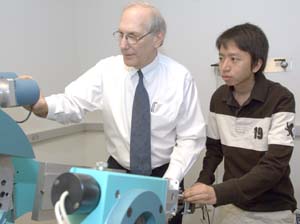Pongsakorn Kanjanaboos chose his life’s work while watching a tennis ball drop to the floor. Then, when given the chance to choose any school in the world to study his favorite subject, he chose Washington University.
Kanjanaboos, who will receive a bachelor of arts in physics in Arts & Sciences this week, discovered his passion for the subject during a 10th-grade prephysics camp in his native Thailand. His teacher mentioned Sir Isaac Newton and asked the class to consider why objects fall to the ground when dropped.

“I dropped a tennis ball three times and came up with the hypothesis that air must be pushing it down,” Kanjanaboos says. “I got the wrong answer, but the experience sparked my inspiration and made me want to be a physicist.”
Kanjanaboos showed such promise in physics, he was chosen by his government to be one of 15 recipients of a scholarship from the Development and Promotion of Science and Technology Talent Project of Thailand. That honor translated into a full scholarship for an undergraduate degree in physics in the country and school of his choice.
“I picked Washington University because it is one of the top schools, and the ratio of faculty to students in physics is one to two,” he says. “Plus, if you want to do research, there is plenty of opportunity here.”
Kanjanaboos, who goes by the nickname “Tom” because it is similar in pronunciation to a Thai nickname, has made the most of those opportunities, according to his mentor, Stuart Solin, Ph.D., the Charles M. Hohenberg Professor of Physics and director of the Center for Materials Innovation.
“It is relatively uncommon for an undergraduate student to be so closely integrated in the research program and to be functioning like a graduate student at such an early age,” Solin says. “But Tom is extremely bright and is a regular player in our lab. He is very motivated and is doing graduate-level work even though he has the obligations of his undergraduate course work as well.”
Despite the demands of his classes — he is double majoring in physics and economics — and his research, Kanjanaboos managed to carve out time to help other University students who faced challenges similar to his. He served as a peer advisor for transfer students, helping them navigate the campus and the class selection process more effectively.
“I remember how hard it is to know what classes to take,” he says. “You have an adviser, but that adviser hasn’t taken the class, so it’s helpful to have a peer adviser who has been there.”
|
College of Arts & Sciences |
Patrick C. Gibbons, Ph.D., professor of physics and Kanjanaboos’ adviser, says he had the opportunity to observe Kanjanaboos with a group of new transfer students last year. “He was a natural at putting them at ease and insisted on introducing them to one of his favorite treats — bubble tea,” Gibbons says.
Kanjanaboos also showed natural talent at organizing students. He founded the Thai Student Association two years ago.
The group decided it wanted to be recognized by the University as an official club, so Kanjanaboos led that effort and served as the club’s first president. Now, the club has about 20 members, some who are Thai students and some who simply enjoy the Thai food and activities that the group hosts.
Soon, however, Kanjanaboos will have to say goodbye to his friends, as he has decided to attend the doctoral program in physics at the University of Chicago. “I realize that my ultimate goal is to be an experimentalist in condensed matter physics,” he says. “After (graduate school), I will go back to work as a professor in Thailand because I want to improve my country and inspire more Thai students.”
Solin says Kanjanaboos has conducted some complicated research regarding quantum magnetism, and he predicts that the young man will someday be one of the stars in condensed matter physics. “He is poised for a high-impact career,” Solin says.